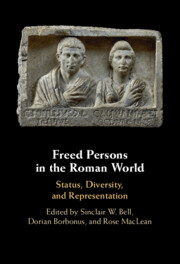Book contents
- Freed Persons in the Roman World
- Freed Persons in the Roman World
- Copyright page
- Contents
- Figures
- Table
- Contributors
- Acknowledgments
- Bibliographical Note
- Introduction
- 1 Permissu decurionum
- 2 Freed Public Slaves in Roman Italy and the Western Provinces
- 3 Fitting in by Decree
- 4 Doubling Up
- 5 The Cost of Ingratitude
- 6 Between Moral Slavery and Legal Freedom
- 7 Framing the Freed Person
- 8 Novel Evidence for Ancient Freed People
- 9 The Affects of Manumission
- General Bibliography
- Index
- References
7 - Framing the Freed Person
(De)contextualizing the Representation of Freed People’s Voices in the Literary Record*
Published online by Cambridge University Press: 16 May 2024
- Freed Persons in the Roman World
- Freed Persons in the Roman World
- Copyright page
- Contents
- Figures
- Table
- Contributors
- Acknowledgments
- Bibliographical Note
- Introduction
- 1 Permissu decurionum
- 2 Freed Public Slaves in Roman Italy and the Western Provinces
- 3 Fitting in by Decree
- 4 Doubling Up
- 5 The Cost of Ingratitude
- 6 Between Moral Slavery and Legal Freedom
- 7 Framing the Freed Person
- 8 Novel Evidence for Ancient Freed People
- 9 The Affects of Manumission
- General Bibliography
- Index
- References
Summary
This contribution attempts to reconstruct the lost voices of Roman freed persons by focusing on the performative function of literary texts, rather than on their authorship. A study of the performative function of texts considers the contextual motivations of an author’s decision to cite, (re)phrase, and frame freed person’s words, and allows for a nuanced deconstruction of certain passages that might otherwise be labeled merely “elite discourse.” The texts chosen for this analysis are Cicero’s correspondence with Tiro, Tacitus’ historical works, and a letter written by the freed man Timarchides as quoted by Cicero in his oratio against Verres. Ultimately, the contribution’s goal is to suggest a methodological approach that – to some extent – rehabilitates literary texts as evidence for the freed person’s voice, and to argue that the value of literary sources when trying to recover this voice lies specifically in the tension between the public limits of freed persons’ (discursive) agency on the one hand, and the range and inventiveness of their self-representation in the context of their own or their patron’s trust network on the other.
- Type
- Chapter
- Information
- Freed Persons in the Roman WorldStatus, Diversity, and Representation, pp. 189 - 216Publisher: Cambridge University PressPrint publication year: 2024

